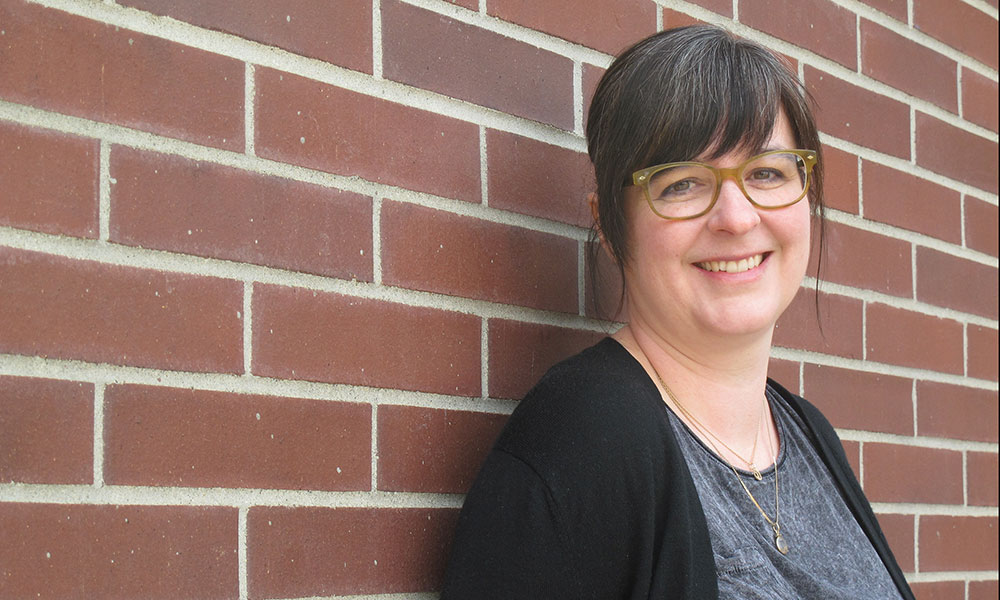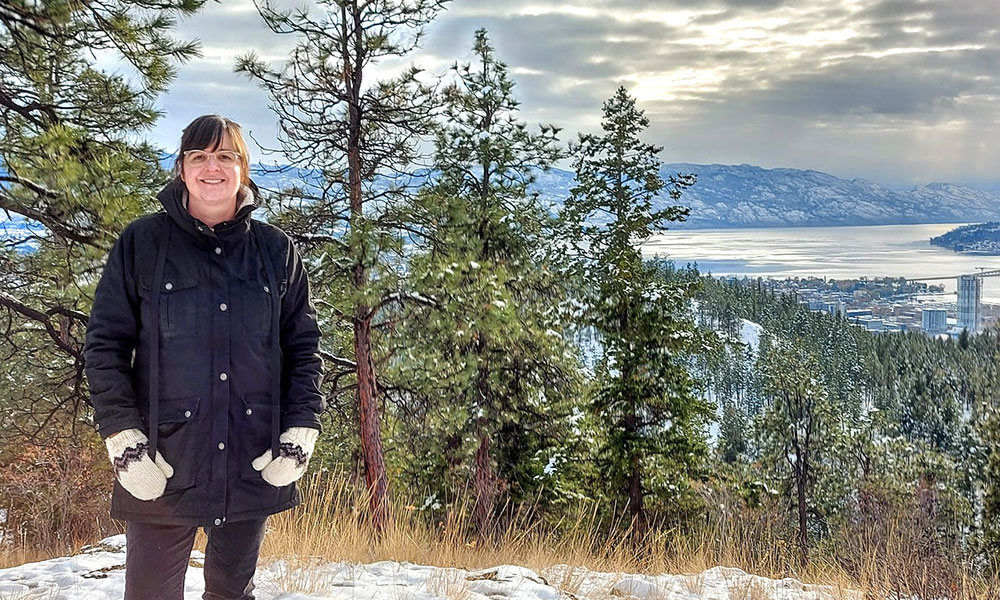Campus Life, Faculty Profile, People, Teaching & Learning
When All the Stars Align
September 27, 2021

About
Name
Heather Latimer
Role
Assistant Professor
Program
Gender and Women’s Studies
Faculty
Irving K. Barber Faculty of Arts and Social Sciences
Campus
Okanagan (Kelowna, BC)
Education
PhD, English, Simon Fraser University
Master of Arts, Gender and Women’s Studies, University of British Columbia
Bachelor of Arts, English, University of Victoria
Hometown
Kamloops, BC
“UBCO has a really dynamic feeling of growth. There are just so many new people, it feels like exciting things are happening.”
HEATHER LATIMER HAS ALWAYS BEEN A WRITER. From her youthful aspirations of becoming a famous novelist to her undergrad forays into creative writing and journalism, it was ultimately academic writing where she found her niche and true passion.
“At the University of Victoria, I took a lot of creative writing classes—I really enjoyed them. But I realized I was not a poet, and it became clear through some trial and error that the kind of writing I wanted to do was maybe more scholarly writing. So, I did an undergraduate degree in English. I followed that with a master’s in gender and women’s studies, and a PhD in English. I guess in some ways, I actually grew up to do the thing I wanted to do—writing—which is amazing.”
While Dr. Latimer credits her mother with instilling in her the values of social justice from an early age, it was her own lived experience that set her on a path towards gender and women’s studies.
“In high school, I witnessed a lot of things I didn’t know the name for, but now looking back they were things like sexual harassment or sexual assault. You would hear about something happening to someone at a party. Or even little things like walking down the hallway, I remember in Grade 7 getting my bra strap snapped constantly and being touched and grabbed. I always knew that wasn’t right, but I didn’t have any vocabulary for why it wasn’t right.”
It wasn’t until university when Dr. Latimer finally found the vocabulary she was looking for. “I remember coming across something called women’s studies and reading about it in the course calendar. A spark went off. I attended those classes and for the first time I was given the language to name and understand these things that I had a hunch were wrong.”
Being able to read scholarship on and openly discuss things like homophobia, sexual assault, and the way racism and sexism come together ignited a passion for Dr. Latimer to come up with solutions to fix the problems around her.
These insights as an undergraduate student shaped Dr. Latimer’s view of herself, the world and her place within it. She now relishes the opportunity to facilitate such experiences in her own classes and finds it rewarding to witness her students coming to their own informed conclusions—especially when they learn from each other rather than from a lecture or textbook.

“You’ll see them grappling and working together, thinking together and learning from each other before having those ‘aha’ moments. I’ve never taught a class where there haven’t been those kinds of moments for students. When your course content focuses so much on what are very personal things—like sexuality, race, gender, family and maybe your personal experiences—those kinds of epiphanies are part of a class for sure.”
When Dr. Latimer had the opportunity to join UBC Okanagan in the Irving K. Barber Faculty of Arts and Social Sciences, it was as if all the stars had aligned. Coming from the bustling metropolis of Vancouver, she delighted in the prospect of improving her family’s quality of life, being closer to her parents, pursuing research at a world-class institution, and of course, being able to enjoy the benefits of a smaller campus.
“I’ve gotten to know my students in ways that just aren’t possible on a campus the size of Vancouver. You run into the same faces all the time—well, before COVID you would run into the same people all the time! You have this intimate experience with your students where you get to know them as people. I love it.”
Students reap the benefits of this reciprocal relationship in Dr. Latimer’s courses on reproductive politics and technologies, sexuality, science and cultural studies. Her open-door policy means that students regularly hang out and discuss coursework. They often comment that they appreciate knowing how she sees herself as a learner in class right there along with them.
“If someone asks me a question and I don’t know the answer, I’ll say ‘let’s go find out about that. Let’s go read about it.’ Yes, I’m the professor and I have a lot more education, training and expertise, but I’m not an expert in everything and I don’t need to act like I’m the sole person who is the authority in the room. I think a strong professor is someone who goes on the learning journey with you as opposed to assuming they always know all the answers.”
Dr. Latimer’s current research examines the central role played by reproductive politics in contemporary dystopian fiction. She says that while stories such as Margaret Atwood’s The Handmaid’s Tale imagine a future society where the state decides who reproduces, who gets to raise children and under what conditions, they are often also about a set of anxieties around technology, citizenship, climate change and xenophobia.
“What I find really exciting is thinking about how this kind of cultural obsession with reproduction and reproductive politics—as played out in these films and books—is also really about a chance to explore and broaden what we mean when we talk about reproduction. Speculative or science fiction, when you’re no longer in the realm of the so-called realistic, you start to see some of the world-building potential of storytelling. You see your world reflected back to you in a different way and that gives you a chance to take stock of what’s actually around you and make new connections.”
Dr. Latimer is quick to debunk the misconception that gender and women’s studies is just for women. “I really want to stress that it’s an incredibly dynamic program where we’re talking about things like transgender feminisms, masculinity, health care or colonialism, for example. We’re talking about race, racism and sexuality, and how all these things are related to what we understand as gender.” She excitedly encourages everyone to consider a gender course. “Join us! That’s my message. Take a gender studies class. Check it out.”
In addition to her research, Dr. Latimer is also developing curriculum, including a course on the history of feminist activism. “My students love to learn about the challenges and problems in the world, but they also want to feel equipped to do something about it. They want to learn about the times that people have made significant changes and have actually been able to disrupt norms or change things.”
Something she finds particularly gratifying is her involvement with the Department of Community, Culture and Global Studies’ Indigenizing the Curriculum Committee, which works to provide resources to help faculty realize the university’s commitment to indigenizing content as per the Truth and Reconciliation Commission’s Calls to Action.
Next semester, if you don’t meet Dr. Latimer in one of her classes, you might just run into her enjoying the fountain outside of the Arts and Science buildings, or taking in the scenery along one of the many campus hiking trails.
“I like to go out there and eat my lunch and sit in the sun and watch the students. I really like that spot. I also really like some of the walking trails around campus. Where it might take you half an hour at UBC Vancouver to walk across campus, UBC Okanagan has this amazing access to nature. You can just go for a nice brisk walk and the trails are so beautiful. Also, UBCO has a really dynamic feeling of growth. There are just so many new people, it feels like exciting things are happening.”